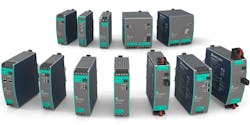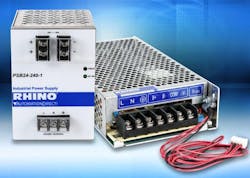Because power supplies are used to deliver a stable and reliable source of electricity to industrial manufacturing machinery, care must be taken to select the right industrial power supplies for your facility. Following are eight key features to prioritize when purchasing industrial power supplies.
Voltage and current ratings—Make sure the industrial power supply you’re reviewing can deliver the required voltage and current levels for the machinery it will power without overloading or underpowering it. This extends beyond pure voltage and current aspects and into other power-related specifications that should be noted by the machinery’s OEM.
Voltage regulation—A critical aspect of power supplies is that they maintain a consistent output voltage even if the input voltage fluctuates. The stability of voltage delivered by an industrial power supply is key to preventing equipment malfunctions and data loss.
Remote monitoring and management—As with nearly every any other critical piece of equipment in your facility, power supplies are now capable of being remotely monitored to assess their operating status and prevent unexpected downtime. In addition to remote monitoring of status, these newer power supplies also provide performance and health statistics.
Efficiency—Energy efficiency is not just about sustainability; it’s about enhancing bottom line margins. That’s why many industry experts strongly recommend the use of industrial power supplies with high energy efficiency ratings. Lower energy consumption also translates to less heat generation, leading to a longer lifespan for the power supply and its connected equipment.
EMI/RFI filtering—Any piece of electronic equipment is potentially subject to electromagnetic interference (EMI) and radio-frequency interference (RFI), particularly in manufacturing environments. Power supplies that feature EMI/RFI filtering capabilities can suppress unwanted electromagnetic noise and ensure clean power delivery.
Protection mechanisms—There are four key electrical issues that any power supply you’re reviewing should be able to protect against:
- Overvoltage protection to prevent damage caused by voltage spikes or surges.
- Overcurrent protection to protect against excessive current draw, which can damage equipment.
- Short-circuit protection to shut off power to equipment if a short circuit occurs.
- Thermal protection to monitor the power supply's temperature and shut it down if it exceeds safe levels. This is critical to preventing overheating and fires.
Temperature range—Because the temperature in manufacturing environments can vary widely, your power supplies should have an operating temperature range that matches your facility’s potential conditions—even the unlikely ones. Redundancy and reliability—Power supplies with redundancy options consist of two or more units that can automatically take over if one fails. This redundancy ensures continuous power delivery and prevents production delays.


